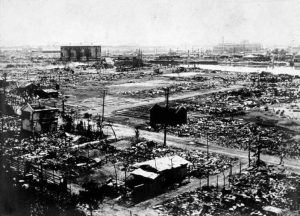This September marks the 100 anniversary of the 1923 Kanto earthquake disaster, which killed more than 100,000 people and left millions homeless in Greater Tokyo. It’s the only natural disaster to strike the Japanese capital in modern history. The magnitude eight earthquake, which hit on September 1, 1923 toppled buildings in densely populated Tokyo, causing widespread destruction.
It also exposed underlying xenophobia and discrimination toward foreigners in Japan.
In the aftermath of the disaster, some 6,000 Korean and Chinese residents were slaughtered over false rumors they were poisoning wells, committing arson, and planning violent riots in retaliation for Japan’s control of Korea and Manchuria. At the time, imperial Japan was an oppressor and racism toward colonial subjects was rampant. The violence continued for three weeks after the earthquake itself.
Every year the anniversary of the Kanto earthquake is remembered by 40 different peace, human rights, and environmental campaigners. They held a minute of silence and some groups staged a rally and acted out the death of victims.
However, the Japanese government has shown little interest in addressing this violent episode. The official narrative is that vigilante gangs and neighborhood watch groups formed as “self protection” against Korean residents. The government also maintains there are no official records on the massacre of Koreans from 1923.
Family members of victims say the Japanese government played a role in downplaying the massacre, either by “covering up” statistics on the number of Koreans who were slaughtered or by failing to conduct a full investigation into how the false rumors spread.
The government says the massacre was the work of private citizens. But testimonies from the time and paintings of the massacre by artists show policemen and Japanese imperial soldiers taking part in the killing spree. The paintings depict a bloodbath in which Korean residents were attacked by mobs carrying swords, iron bars, and bamboo sticks. The victims’ bodies were eventually burned amid the martial law enforced to restore order.
During the anniversary commemoration, the Tokyo Diet Members Network for the Promotion of Japan-North Korea Friendship addressed a group of campaigners, saying that the repeated insistence that no records of a massacre exist only serves to deny the past and allow discrimination to continue.
One hundred years later, the issue is still an open wound. Campaigners say they are still searching for an apology and answers. An organization commemorating the 1923 Korean massacre argues that the Japanese government turned a blind eye to the violence toward foreigners. At a press conference in Seoul, they called on the government to take responsibility.
Mayor of Tokyo Koike Yuriko has been accused of taking an anti-Korean stance after failing to send a message to the commemorative event remembering the Korean victims. The annual event has been held in Tokyo since 1974. In Koike’s first year in office, she submitted an official letter expressing regret over the deaths. But since 2017 the Tokyo Metropolitan Government has been reluctant to give formal support to the event.
What’s more, last year the Tokyo government banned the public showing of a movie depicting the genocide of Korean residents, spurring criticism that the metropolitan government was undertaking a campaign of censorship to deny the massacre took place.
Some critics argue the government’s silence cedes space to Japanese right wing groups who hold anti-Korean protests on the anniversary massacre. They say right wing groups are given a platform to push a narrative that violence against ethnic Koreans was self-defense.
In March a group of lawmakers from ruling and opposition parties jointly submitted a bill to clarify the truth about the source of the anti-Korea rumors and the government’s handling of the ensuing violence. But no new information has surfaced on the issue.

































